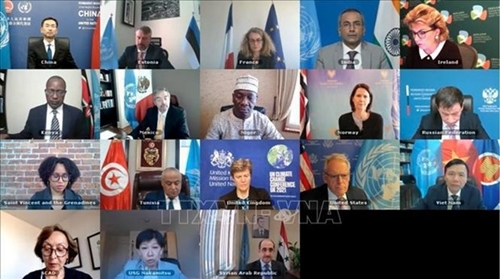Ilene Cohn, Officer-in-Charge of the UN Mine Action Service (UNMAS), told the Vietnam News Agency that Vietnam put forward the issue at the right point of time, expressing her delight at Vietnam, as Council President, choosing the unexploded ordnance (UXO) issue as the topic for one of the main debates in April.
    |
 |
|
Some of the participants in the UNSC open debate, held both virtually and in person on April 8. |
She noted that the meeting held great importance since the UNSC is the body responsible for resolving issues to maintain the world’s peace and security, especially when bombs and landmines remain threats to people around the globe.
Cohn said Vietnam has obtained much progress in mine action, but there remains much to do for a world free of lethal weapons.
Ambassador Dang Dinh Quy, Permanent Representative of Vietnam to the UN, said UXOs are always “silent killers”, but two new issues have emerged in recent years: the increasingly widespread use of controlled improvised explosives and the use of these improvised devices to attack peacekeeping missions.
Impacts of the COVID-19 pandemic have also made this issue even more serious, he noted.
Quy added that the UXO issue has been rarely discussed at the UNSC as it was not supported by countries’ previous policies. Therefore, Vietnam’s chairing of the signature debate about mine action has met the international community’s concern.
Sudan, one of the countries hit hard by conflicts and UXOs, also spoke highly of Vietnam’s selection of the mine action issue for the open debate.
Chargé d’affaires Mohammed Elbahi from the Sudanese mission to the UN said there remains much UXO aftermath in Sudan that has considerably affected the country’s development process and caused much pain for its people.
He also affirmed his country’s commitment to exerting efforts to finish the settlement of the remaining UXOs in the near future.
At the meeting, the UNSC adopted a presidential statement viewed as “unprecedented” in four years that stresses the implementation of the existing legal framework, particularly UNSC Resolution 2365, points out new challenges, and sets up new measures the international community needs to take to promote mine action.
Source: VNA